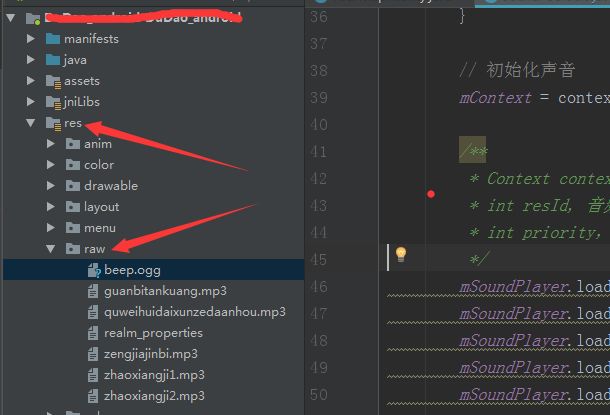SoundPool音频播放
学之广在于不倦,不倦在于固志。 ——晋·葛洪
(学问的渊博在于学习时不知道厌倦,而学习不知厌倦在于有坚定的目标)
注意:已更新SoundPool在停止播放音效时的错误 更新时间:2018.8.27
001.Android中播放简短的音频建议首选SoundPool:
---> SoundPool使用音效池来管理多个简短的音效,并且以ID的形式管理音频文件,SoundPool还支持设置音频的品质、声音大小、播放比率、是否循环等
---> 用于播放短促、体积比较小的音频文件,如通知铃声、解锁铃声、相机照相声音
---> SoundPool在API21之前通过类构造器直接new即可使用,详细见下面代码
在API21之后可以通过建造者模式创建SoundPool对象,可以设置多项内容,即
SoundPool mSoundPlayer= new SoundPool.Builder().setMaxStreams(8).build();---> SoundPool可以播放.MP3等格式的音频(亲测这种有效)
一般将音频文件存放于raw文件夹:在Android工程目录下的res目录下新建raw文件夹,将音频文件放入
---> 详细使用见代码:
public class SoundPoolUtils {
/**
* int maxStreams:最大的流的数量(播放数量)
* int streamType:流的类型
* int srcQuality:频的质量,默认是0,目前没有影响
*/
private static SoundPool mSoundPlayer = new SoundPool(8, AudioManager.STREAM_SYSTEM, 0);
private static SoundPoolUtils soundPlayUtils;
// 上下文
private static Context mContext;
/**
* 初始化
*
* @param context
*/
public static SoundPoolUtils init(Context context) {
if (soundPlayUtils == null) {
soundPlayUtils = new SoundPoolUtils();
}
// 初始化声音
mContext = context;
/**
* Context context,
* int resId, 音频文件的地址:R.raw.deep
* int priority,优先级:都是短促音频无影响设置为1即可
*/
mSoundPlayer.load(mContext, R.raw.guanbitankuang, 1);// 1
mSoundPlayer.load(mContext, R.raw.quweihuidaixunzedaanhou, 1);// 2
mSoundPlayer.load(mContext, R.raw.zengjiajinbi, 1);// 3
mSoundPlayer.load(mContext, R.raw.zhaoxiangji1, 1);// 4
mSoundPlayer.load(mContext, R.raw.zhaoxiangji2, 1);// 5
return soundPlayUtils;
}
/**
* 播放声音
* 注意,此处必须返回播放的流Id,因为在后面停止的时候需要传对应的id来停止
*/
public static int play(int soundID) {
/**
* int soundID, 声音的id(即:load到SoundPool的顺序,从1开始)
* float leftVolume, 左\右声道的音量控制, 0.0 到 1.0
* float rightVolume, 左\右声道的音量控制, 0.0 到 1.0
* int priority, 优先级,0是最低优先级
* int loop, 是否循环播放,0为不循环,-1为循环
* float rate 播放比率,从0.5到2,一般为1,表示正常播放
*/
return mSoundPlayer.play(soundID, 1, 1, 0, 0, 1);
}
/**
* 释放资源
* 注意:此处如果你传的是你播放的对应的id就会出现第一次release正常停止,第二次停止不了,原因可以看源码解释
*/
public static void releaseSound(int sounId) {
if (null != mSoundPlayer) {
mSoundPlayer.stop(sounId);
mSoundPlayer.release();
mSoundPlayer = null;
}
}
}注意:在load声音之后并不能立即播放,因为声音还没有加载完成,应该给其充足的时间让其加载完成,比如在onCreate()方法中让其加载,在需要的地方调用play()。
@Override
protected void onCreate(Bundle savedInstanceState) {
super.onCreate(savedInstanceState);
SoundPoolUtils.init(this);
//......
}
mSound.setOnClickListener(new OnClickListener() {
@Override
public void onClick(View v) {
//播放第4个音频文件,需要停止的话就拿到播放时返回的流Id即可
//SoundPoolUtils.play(4);
soundId=SoundPoolUtils.play(4);
}
}); /**
* 销毁时释放你的音效文件,soundId是你播放时返回的流Id
*/
@Override
protected void onDestroy() {
SoundPoolUtils.releaseSound(soundId);
super.onDestroy();
}002.Android中播放音、视频可以选用MediaPlayer:
---> MediaPlayer可以播放比较长的音视频文件,有播放状态的回调
---> MediaPlayer启动延迟高,需要及时释放资源,有各种状态判断
003.Android中播放音频还可以选用AudioTrack:
---> AudioTrack可用于播放pcm格式的音频,不是很了解这个API,仅供参考!
Last :关于SoundPool的详细资料可以参考官网:--官网直通车--
